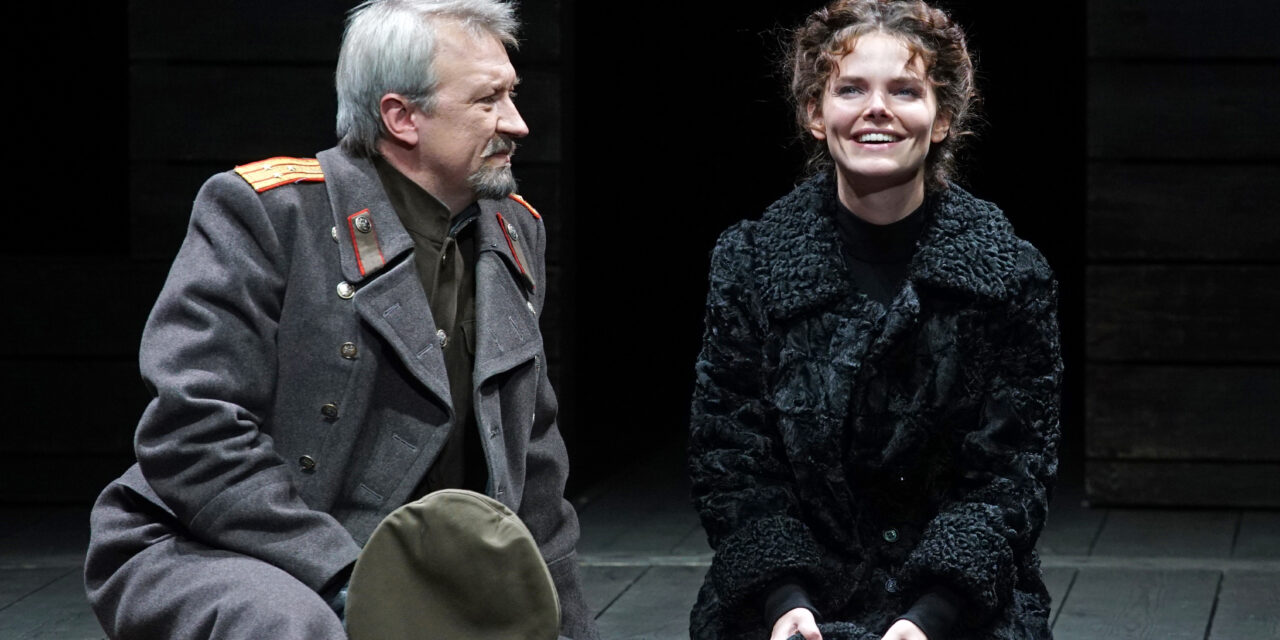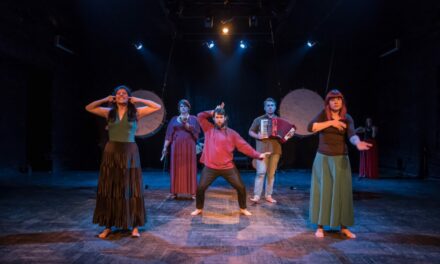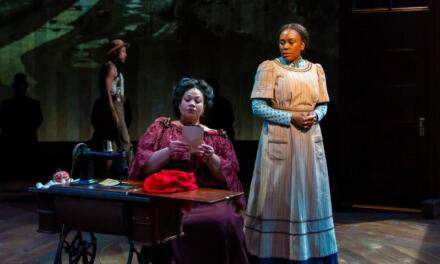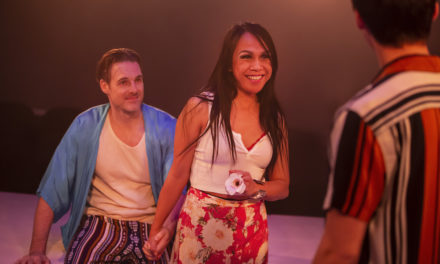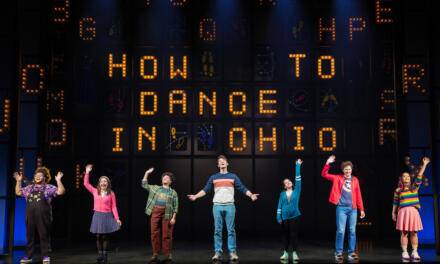Three Sisters was the last play Chekhov wrote in 1900, in his dacha in Yalta, and in the final stages of his life, cut short by tuberculosis. He died four years later, aged 44.
Though this play has many features of his previous dramatic works – unrequited love, missed opportunities, passive longing for greater things – it is also distinguished by the fact that it places three female tragic protagonists and their brother at the centre of the story. If you visit Chekhov’s dacha in Yalta, you’ll be told of the local library’s record that one of the last books Chekhov borrowed was a biography of the Brontë sisters.
Unlike the protagonists of Chekhov’s first play The Seagull, and unlike the Brontës themselves, none of the Prozorovs have artistic or literary ambitions (except perhaps Andrey Prozorov, who mostly plays his violin off-stage). By this point, and perhaps most notably via Uncle Vanya, one of Chekhov’s main concerns seems to have become an idea of work itself as part of life’s purpose and regardless of its specific nature. Maybe this was because he himself combined different kinds of labour in his life as a practicing doctor and author. But even though a marginal doctor figure is still present in the Three Sisters, like it was in The Seagull and Uncle Vanya, Chekhov was definitely keeping autobiographical concerns away from his work and distilling personal experience into something more generally relatable. The main professional denominations represented here are itinerant military men and intellectuals stifled by the province. Only the final lines of Three Sisters, spoken by the oldest sister Olga – ‘If only we knew what we are living for, why we are suffering […] if only we knew, if only we knew’ – betray a potential personal concern of the author facing the prospect of impeding death.
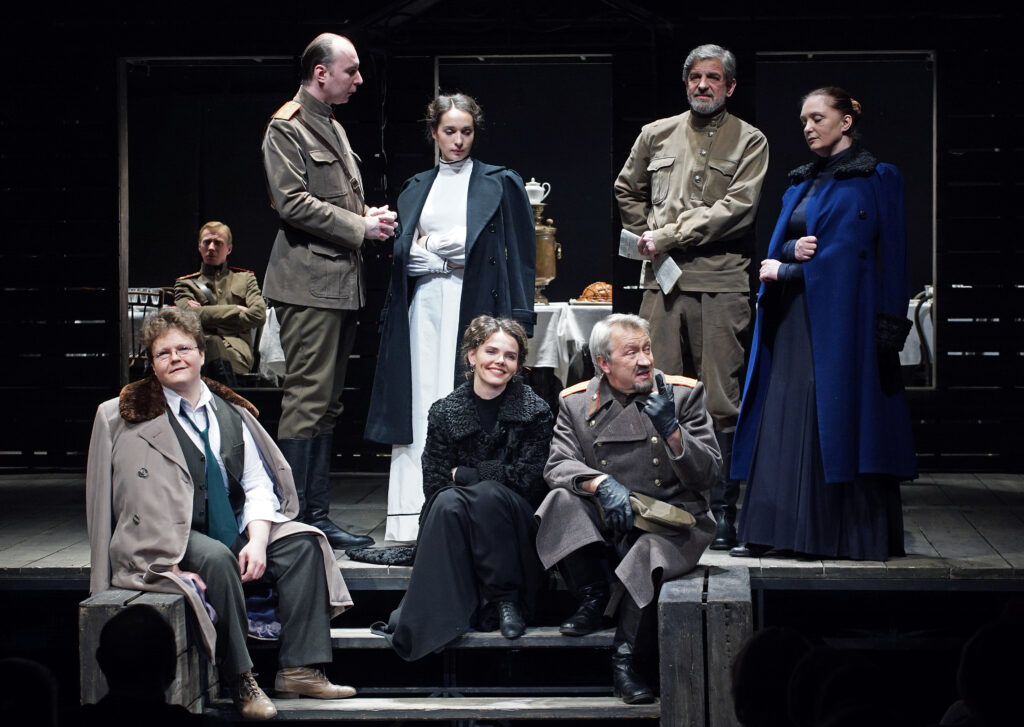
The cast of Three Sisters. Photo by Maly Drama Theatre of St Petersburg.
It is doubtful that we could get a more sensitive and considered theatrical reading of Chekhov than those offered by Lev Dodin’s Maly Theatre of St Petersburg, currently on tour in London. Over the last five decades, Dodin has built an impressive international career mostly on the principles of deep ensemble work and adaptations and productions of Russian classics. Although Dodin’s work has often been quietly spectacular, this production is not necessarily the director’s theatre of a flashy kind one might associate with Ivo Van Hove or Robert Lepage. Rather, it is a more meditative, stamina-based type of creation where detail begins to crystallise and shine through in a completely new light.
Alexander Borovsky’s set and costume design is almost rudimentary in its simplicity: a house front constructed from plain planks of wood, one doorway, two rows of windows, a staircase downstage centre. This serves not so much to conjure up a sense of realism, but to provide a framing for action and individual characters. Dodin’s direction is gentle and patient and compelling and quite airy. The house front moves forward a little in between acts, and by the time we get to the final, fourth act, it has brought the lives of these people so close to us that we feel as though we breathe in sync. By the final act, the director is so explicitly uninterested in an illusion of reality that he uses the set structure and the presence of actors to frame and illuminate individual characters even when they are meant to be spoken about in absentia. When Olga (played by Irina Tychinina) arrives in the final act, newly promoted as a headmistress, and thus living a life of apparent privilege she never aspired towards, she simply stands still, framed by the central doorway, in her regal winter coat and hat, for the duration of her entire scene. Even her facial expression is frozen, but in this stillness we can read a paralysis of a different kind, only broken by the eyes that contain all depth of emotion.
As is usually the case with the Maly, the actors’ performances are studious, layered and supremely controlled. The character portraits are fully realised by means of inner life development and so Igor Chernevich’s Lieutenant Vershinin, in love with melancholic Masha, is not the eye-candy that one might expect but an aging gentleman, exhausted by the misfortunes of his private life. There is no young love in this production, even for Irina who is the youngest character. Dodin’s most notable intervention in reading the play is however an introduction of sporadic eruptions of passionate kisses shared by various couples – even at one point between Olga and Kuligin, prompted by the often overlooked line ‘I should have married you’, and adding a completely new meaning to Olga’s disapproval of Masha’s confession of adulterous feelings.

Irina Tychinina, Sergey Vlasov, Igor Chernevich and Elizaveta Boyarskaya in Three Sisters. Photo by Maly Drama Theatre of St Petersburg.
In his director’s note, Dodin bases his rationale for this production made in 2010 on Chekhov’s ‘skeptical yet optimistic view of the human condition’ and ‘the beautiful hopelessness of our lives’. He primarily reads this play as being a contemplation of loss, yet however, he complicates this evasive notion of the meaning of life that rings through the play as a whole, with unexpected and surreptitious outbursts of heart-rendingly intense passion.
This post was written by the author in their personal capacity.The opinions expressed in this article are the author’s own and do not reflect the view of The Theatre Times, their staff or collaborators.
This post was written by Duška Radosavljević.
The views expressed here belong to the author and do not necessarily reflect our views and opinions.

